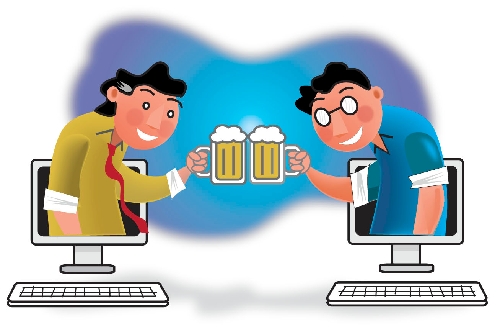Facebook changing the meaning of friendship
How many friends do you have? 50? 100? 500?
For Facebook fans, the answer can be found in the box in the left-hand column of their home pages.
But how many of those people represented by the tiny photos -- or, for the new, tech averse or lazy, that silly silhouette -- would loan you a couple of hundred bucks? Take the time to comfort you after a romantic breakup? Check in on you when you're sick?
With all the cool things Facebook and other social media sites let us do -- reconnect with people we haven't seen in ages, share vacation photos with everybody we know, vent our frustrations du jour to everybody within cyber-earshot -- they've also done something linguistically unexpected.
They've changed -- or, critics would say, diluted -- the meaning of "friend" in ways poets couldn't have imagined.
It's not surprising, though. Julian Kilker, an associate professor of journalism and media studies at the University of Nevada, Las Vegas who studies emerging techologies, notes that technology often tends to alter the meanings of words it touches.
"There's a long history of terms sort of being modified by technology, particularly electronic technology," Kilker says.
"The word 'community' is one of those examples. The notion of 'community' has shifted. Initially, we had to preface 'community' with 'online' -- for example, saying, 'my online community.' "
Such shifts in words' meanings do, Kilker adds, make sociologists "a little frustrated."
"Community" for instance, once required "co-location, that you had to be in the same place," he explains. Now the meaning of the word "has morphed slightly, at least in the popular sense, to include connection in a virtual environment.
"I think the same thing is happening with 'friend' right now. Our notion of what a 'friend' is is shifting, and I think if you talk to people of different demographics -- particularly different ages -- you'll find, if you ask them the definition of 'friend,' they have very different notions of that."
Does the mishmash of friend-friends, casual friends, work friends, friends of friends and friend-seeking strangers gathered on the typical Facebook users' page constitute "friends" in any practical sense?
"The answer to that is mostly no," answers Ronald Lawrence, executive director of the Community Counseling Center of Southern Nevada.
"You may call yourself friends. You may share a lot of things," Lawrence says. But, for Lawrence, friendship is built upon, and is nourished by, multiple levels of interaction beyond just words on a computer screen.
"It's social, it's emotional, it's psychological and it's spiritual," Lawrence says, and "it's hard to experience those dimensions on a flat screen."
In a friendship, "there is something ... that happens at unconscious levels, and I actually believe that people have to be in contact with each other, in the presence of each other, to experience that friendship," he adds.
Lawrence, by the way, is not on Facebook.
"Myself, I won't become a part of it," he explains. "I want my relationships to be in person and deep, and that's just the way it is."
Donna Wilburn, a licensed marriage and family therapist, suspects that the meaning a person ascribes to the word "friend" may reveal more about the person using the word than the definition of the word itself.
"For instance, somebody who is really in desperate need of friends and who doesn't have any other support system would really hook onto that word, because that's what they need," Wilburn says. In contrast, "someone who has plenty of (real-life) friends and who has no desperate need for friendship would not use the word when talking about Facebook friends.
"There's a difference between Facebook friends and friends, but for someone who's really needy and doesn't have a support system, they rely on Facebook friends and bond with them and see them in a different context."
Wilburn is on Facebook and says she has Facebook friends "I would not share my personal information with" because "they are not, to me, actual friends unless I actually know them and have bonded with them."
Just as they do in real life, Wilburn says, many social media users probably view online "friendship" as a spectrum of relationships ranging from acquaintances to casual friends to, at the other end, best friends.
Another change social media bring to friendship is that, for good or bad, it makes it easy to form and maintain friendships.
Too busy to send a birthday card? Dash off a quick birthday greeting for her wall. Tired of listening to a friend ramble? Log off. Want to end the friendship completely? Avoid the stress of an in-person breakup by just de-friending him and he'll be none the wiser.
Through technology, Wilburn says, "I think we are losing our skill and desire to communicate face to face, and I think that's going to affect us negatively, socially."
Online interaction can be less stressful than face-to-face interaction, but it ultimately ends up being isolating, Wiburn says. "I think you need that (real-life) experience, and you need to socialize face to face."
"Are we losing or changing our definition of what a 'friend' is based on Facebook friends? Are we now blurring what is a friend? Are we clear what is a friend, or are we just making everybody a friend?"
It's a tricky question to answer, and that trickiness may reveal itself when people happen across, in real life, friends they've made on Facebook.
Some, Wilburn has noticed, "are, like, 'Yes, we're friends. We connected and we bonded.' "
And, she adds, "I've come across people who see their Facebook friends in public and don't acknowledge them as friends."
Contact reporter John Przybys at jprzybys@ reviewjournal.com or 702-383-0280.

















